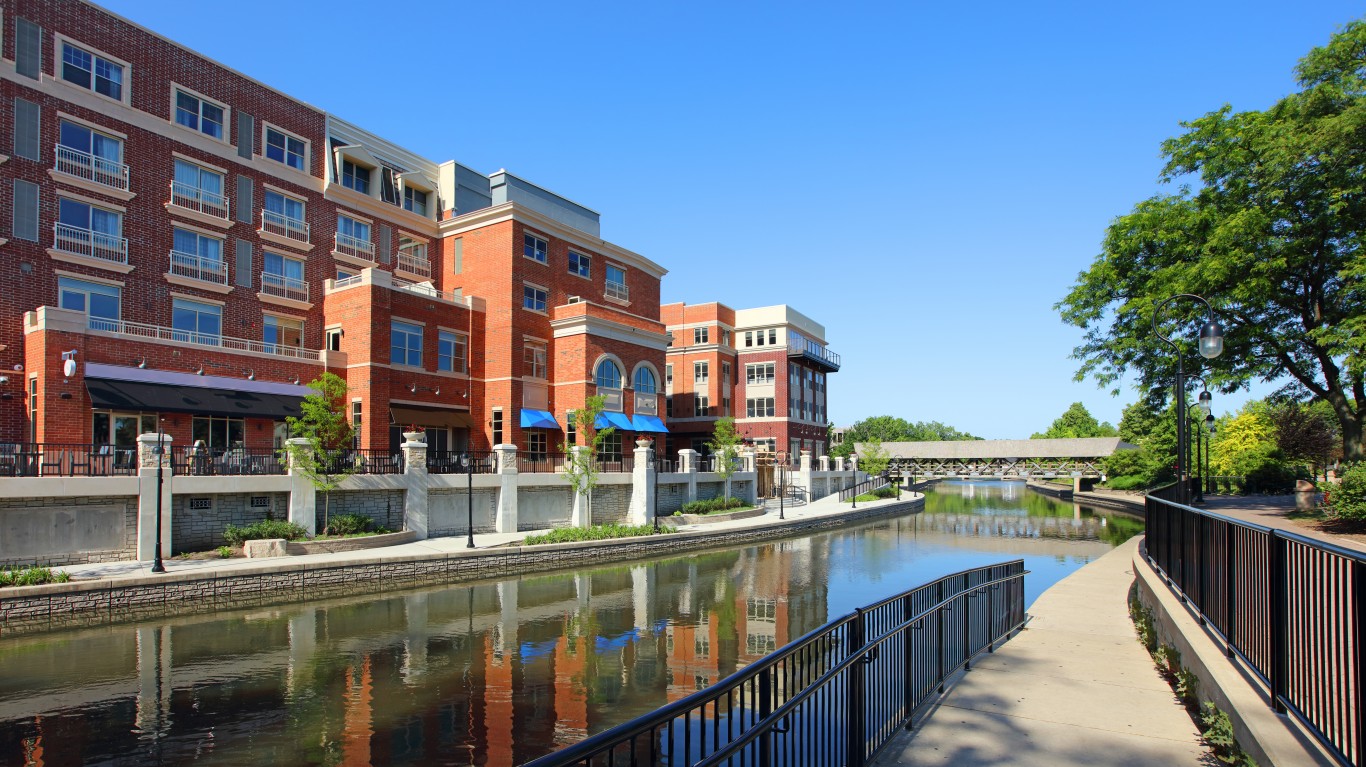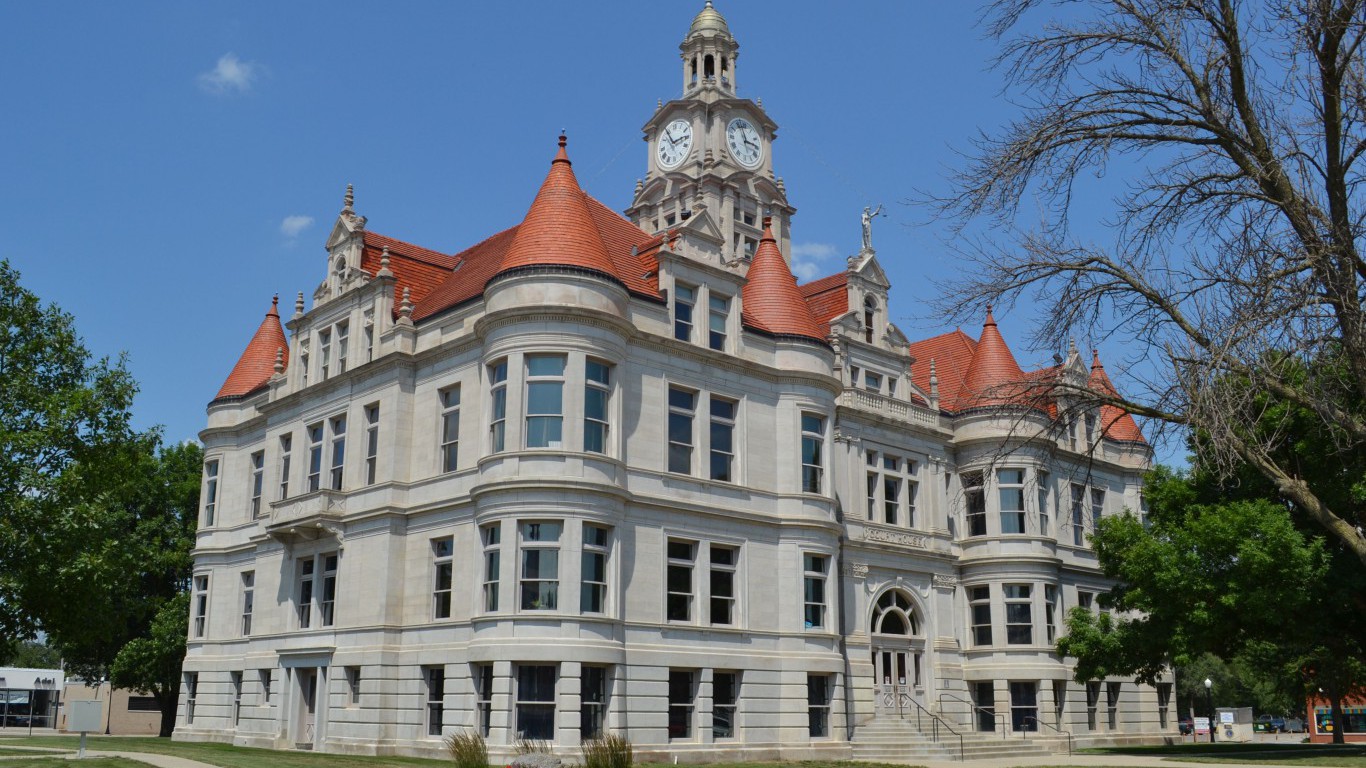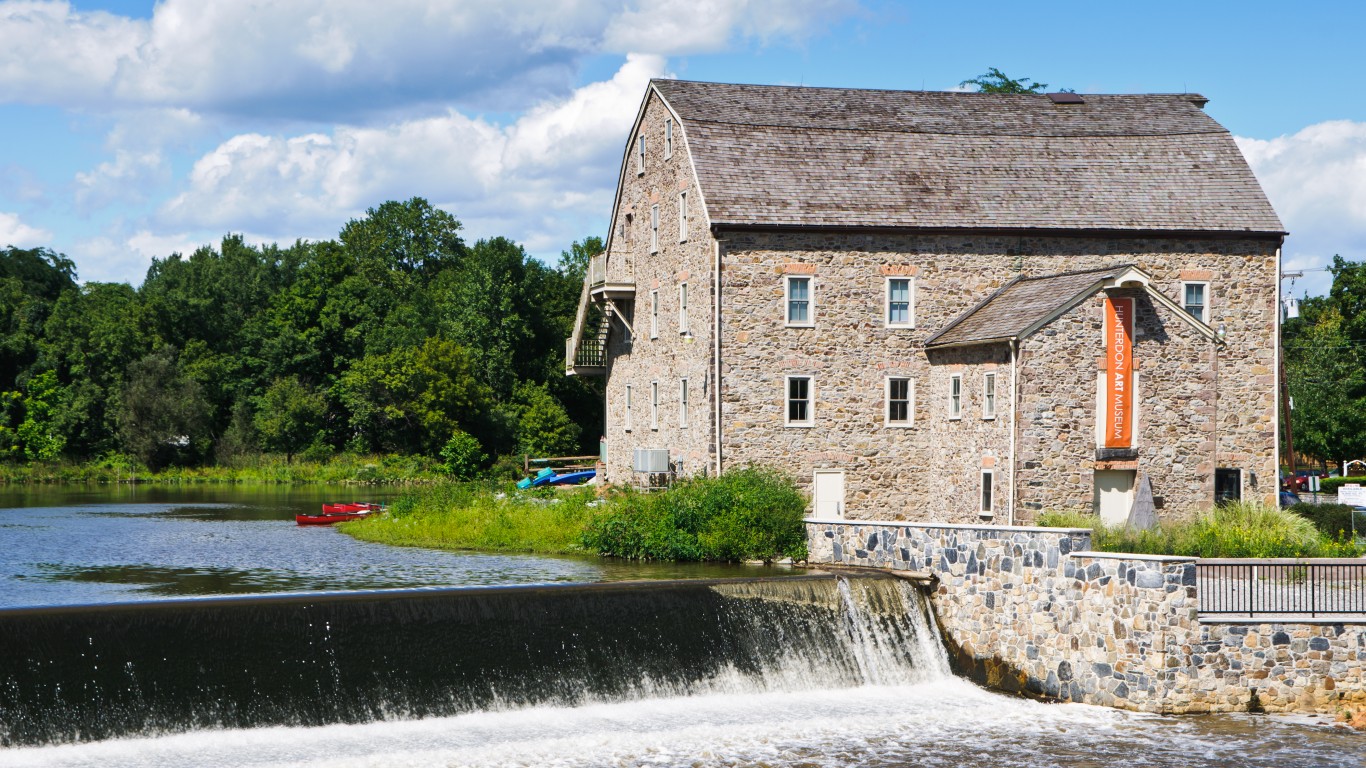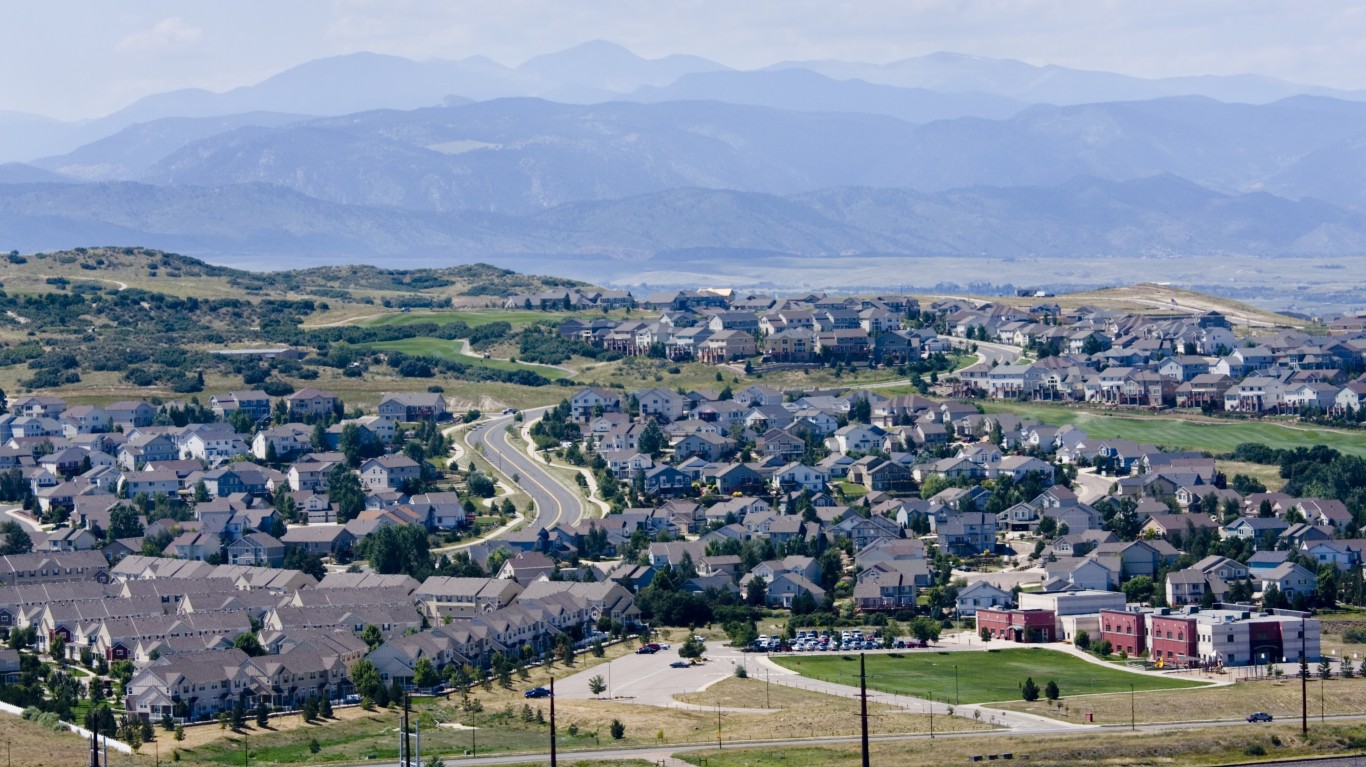
Compared to the rest of the world, the United States has a relatively high standard of living. Still, in a country home to over 328 million people spanning nearly 3.8 million square miles, standards of living vary considerably from place to place — and some parts of the country stand out as examples of the high level of prosperity that is achievable in the United States.
While there are countless factors — many of them subjective — that can contribute to or detract from quality of life, there are a few key objective measures that can reveal a great deal about a given area. The United Nations Development Programme identified some of these measures and with them created the Human Development Index, a tool to better gauge and compare quality of life at a national level.
Inspired by the HDI, 24/7 Wall St. created an index consisting of three measures — poverty, life expectancy at birth, and bachelor’s degree attainment — to identify the best U.S. counties to live in. Our list also includes independent cities that do not fall within the boundaries of a county or county equivalent.
The three measures used to create this list are closely related to each other. People living in poverty are often less able to afford health care or healthy lifestyles, both of which can have serious health repercussions. Similarly, higher educational attainment has been shown to improve health outcomes and reduce the likelihood of unemployment and financial hardship. Both low poverty rates and high educational attainment rates are often common in parts of the U.S. with high life expectancy at birth.
Many of the best counties to live in either encompass, or are within commuting distance to, a major urban area. Densely-populated cities — like New York, San Francisco, and Washington D.C. — tend to have a high concentration of jobs, which draws in educated workers and reduces the likelihood of financial hardship. In all but a handful of counties on this list, the January 2021 unemployment rate was below the comparable 6.8% national rate. Here is a look at the American cities that added jobs during the pandemic.
There are also a handful of counties on this list that are not within commuting distance of a major city but in relatively remote areas that are popular destinations for outdoor recreation. By some measures, these places, which include several counties in the Colorado Rockies, have some of the healthiest populations in the United States. Here is a look at the 25 best cities for active people.
Click here to see the best counties to live in.
Click here to read our detailed methodology.

50. Nassau County, New York
> Poverty rate: 5.6%
> Adults with a bachelor’s degree: 46.0%
> Life expectancy at birth: 82.9 years
> Total population: 1,356,509
> Largest place in county: Hempstead
Nassau County, New York, located on Long Island, ranks among the best counties to live in the United States. Quality of life in Nassau County is due in part to the area’s prosperity. Most households earn over $116,000 a year — the highest median household income of any New York county. Also, only 5.6% of the population live below the poverty line, one of the lowest poverty rates in the state.
The county’s relatively high incomes are due in part to the local educational attainment rate. College-educated adults are less likely to face unemployment, and they earn about 67% more on average workers with no more than a high school diploma. In Nassau County, 46.0% of adults have a bachelor’s degree or higher, compared to 32.1% of adults nationwide.
[in-text-ad]

49. Orange County, North Carolina
> Poverty rate: 13.7%
> Adults with a bachelor’s degree: 59.7%
> Life expectancy at birth: 82.1 years
> Total population: 144,836
> Largest place in county: Chapel Hill
Orange County, North Carolina, located in the Raleigh-Durham-Chapel Hill area, ranks among the best counties to live in largely due to the high bachelor’s degree attainment rate. Nearly 60% of area adults have a four-year college education or higher. The county’s high educational attainment rates are not surprising as it borders the part of the state known as the Research Triangle, named for the three research universities in the area — North Carolina State, Duke, and University of North Carolina Chapel Hill.
The area is also home to a high concentration of employers in manufacturing, life sciences, and technology, and partially as a result, unemployment is low. As of January, just 4.3% of the labor force were out of work, compared to the national 6.8% jobless rate.
48. Clear Creek County, Colorado
> Poverty rate: 7.8%
> Adults with a bachelor’s degree: 48.1%
> Life expectancy at birth: 83.9 years
> Total population: 9,495
> Largest place in county: Idaho Springs
Clear Creek County, Colorado, located just west of Denver, ranks among the best places to live largely because of its low poverty rate and high average life expectancy. Just 7.8% of local residents live below the poverty line compared to 13.4% of all Americans, and life expectancy at birth in the county is 83.9 years — about four years longer than the national average.
Americans living below the poverty line are less likely to be able to afford health care and healthy lifestyle options — and the area’s higher life expectancy is due in part to the relative lack of poverty as well as healthy lifestyles. For example, adults in Clear Creek are far less likely to smoke and more likely to exercise than the typical American adult.

47. King County, Washington
> Poverty rate: 8.9%
> Adults with a bachelor’s degree: 52.5%
> Life expectancy at birth: 82.4 years
> Total population: 2,195,502
> Largest place in county: Seattle
King County, Washington, which covers Seattle, ranks as one of the best counties to live in the United States largely for its well-educated population. Over half of all area adults have a bachelor’s degree or higher compared to fewer than one third of all American adults.
Higher educational attainment is linked with healthier lifestyles and better health outcomes. In King County, only 8.8% of adults smoke, compared to 17.1% of U.S. adults, and only 22% of adults are obese, compared to 29% of adults nationwide. Smoking is the leading cause of preventable death in the United States, and obesity is a risk factor for many potentially fatal diseases and conditions. The reduced likelihood of these risk factors likely partially explains the county’s relatively high life expectancy at birth in the county, which at 82.4 years is more than three years above the national average.
[in-text-ad-2]

46. DuPage County, Illinois
> Poverty rate: 6.4%
> Adults with a bachelor’s degree: 49.4%
> Life expectancy at birth: 82.4 years
> Total population: 929,060
> Largest place in county: Naperville
Many of the best counties to live in the U.S. are in close proximity to a major city. DuPage County, Illinois, located just west of downtown Chicago, is one of them. DuPage is the best educated county in the state, with 49.4% of adults in DuPage County holding a bachelor’s degree or higher, compared to just 32.1% of all adults nationwide.
Higher educational attainment tends to drive up incomes and reduce the likelihood of financial hardship. In DuPage County, just 6.4% of the population live below the poverty line, less than half the 13.4% national poverty rate. Additionally, 14.8% of local households earn at least $200,000 a year, nearly double the 7.7% of households nationwide who do.

45. San Juan County, Washington
> Poverty rate: 10.2%
> Adults with a bachelor’s degree: 49.8%
> Life expectancy at birth: 85.5 years
> Total population: 16,788
> Largest place in county: Friday Harbor
San Juan County, Washington, encompases a cluster of islands in Puget Sound, northwest of Seattle. Life expectancy in the county is 85.5 years at birth, over six years longer than the national average.
The county’s high average life expectancy is attributable in part to healthy behaviors. Adults in San Juan County are far less likely to smoke or be obese and more likely to exercise regularly than the typical American adult. Across broad populations, higher educational attainment is tied to healthier lifestyles and better health outcomes. In San Juan County, about half of the 25 and older population have a bachelor’s degree or higher, well above the comparable national share of about one-third.
[in-text-ad]

44. York County, Virginia
> Poverty rate: 4.9%
> Adults with a bachelor’s degree: 47.1%
> Life expectancy at birth: 82.7 years
> Total population: 67,982
> Largest place in county: Yorktown
York County, Virginia, is located in the eastern part of the state along the York River, near where it empties into the Chesapeake Bay. A wealthy area, the typical household in York County earns just over $92,000 a year — nearly $30,000 more than the typical American household. In addition, the area has a low poverty rate. Just 4.9% of the local population live below the poverty line, compared to 13.4% of all Americans who do.
Americans with greater financial security are better able to afford adequate health care and a wider variety of healthy lifestyle options. Partially as a result, places with low poverty rates also tend to have higher than average life expectancies. In York County, life expectancy at birth is 82.7 years, more than three years higher than the national average.

43. Nantucket County, Massachusetts
> Poverty rate: 8.7%
> Adults with a bachelor’s degree: 52.8%
> Life expectancy at birth: 82.8 years
> Total population: 11,168
> Largest place in county: Nantucket
Nantucket County, Massachusetts, which encompasses the island of Nantucket, is one of the best places to live in the United States. Life expectancy at birth on the island is nearly 83 years — four years more than the comparable national average.
The county’s high average life expectancy is attributable in part to healthy behaviors. Adults in Nantucket County are far less likely to smoke or be obese and more likely to exercise regularly than the typical American adult. Across broad populations, higher educational attainment is tied to healthier lifestyles and better outcomes. In Nantucket, over half of the 25 and older population have a bachelor’s degree or higher, well above the comparable national share of less than one-third.

42. Fairfax, Virginia
> Poverty rate: 9.3%
> Adults with a bachelor’s degree: 60.8%
> Life expectancy at birth: 78.9 years
> Total population: 23,531
> Largest place in county: Fairfax
Fairfax is an independent city in northeastern Virginia, just outside of Washington D.C. The city ranks among the best places to live in the United States largely because of its well-educated population. Nearly 61% of adults living in Fairfax have a bachelor’s degree or higher, compared to 32.1% of adults nationwide.
College-educated adults are less likely to face unemployment and financial hardship than workers with no more than a high school diploma. In Fairfax, just 4.7% of the labor force are unemployed, compared to the 6.8% national jobless rate, and only 9.3% of the population live below the poverty line, compared to the 13.4% national poverty rate.
[in-text-ad-2]

41. Ozaukee County, Wisconsin
> Poverty rate: 5.3%
> Adults with a bachelor’s degree: 49.0%
> Life expectancy at birth: 82.3 years
> Total population: 88,597
> Largest place in county: Mequon
Ozaukee County, Wisconsin, is located along the shore of Lake Michigan, just north of Milwaukee. County residents are more likely to be relatively financially secure than those in nearly any other part of the state. Just 5.3% of the local population live below the poverty line, and 12.4% of households earn at least $200,000 a year — compared to the nationwide shares of 13.4% and 7.7%, respectively.
College-educated adults are less likely to live in poverty and earn about 67% more on average than workers with no more than a high school diploma. In Ozaukee County, 49.0% of adults have a bachelor’s degree or higher, compared to 32.1% of adults nationwide.

40. Bergen County, New Jersey
> Poverty rate: 6.7%
> Adults with a bachelor’s degree: 49.3%
> Life expectancy at birth: 83.2 years
> Total population: 930,390
> Largest place in county: Hackensack
Many of the best counties to live in are in close proximity to a major city. Bergen County, New Jersey, located across the Hudson River from New York City, is one of them. Located in perhaps the most concentrated job market in the United States, job opportunities are widespread in and around Bergen County, and partially as a result the local poverty rate of 6.7% is half the comparable 13.4% national rate.
Bergen County also has a well-educated population and a high average life expectancy. An estimated 49.3% of adults in the area have a bachelor’s degree or higher, compared to just 32.1% of adults nationwide. Additionally, life expectancy at birth in the area is 83.2 years, four years longer than the national average.
[in-text-ad]

39. Oconee County, Georgia
> Poverty rate: 6.2%
> Adults with a bachelor’s degree: 52.3%
> Life expectancy at birth: 81.4 years
> Total population: 38,132
> Largest place in county: Watkinsville
Oconee County, Georgia, is located in the northern part of the state, just south of Athens. At 81.4 years, life expectancy in the county is nearly the highest in the state and over two years longer than the national average. Across broad populations, higher educational attainment is linked to healthier lifestyles and better health outcomes. In Oconee County, 52.3% of adults have a bachelor’s degree or higher, well above the 32.1% share of adults nationwide.
High quality of life in Oconee County is partially the result of relative financial security. Just 6.2% of local residents live below the poverty line, less than half the 13.4% of all Americans who do.

38. Chester County, Pennsylvania
> Poverty rate: 6.4%
> Adults with a bachelor’s degree: 53.0%
> Life expectancy at birth: 81.4 years
> Total population: 519,560
> Largest place in county: West Chester
Chester County, located in southeastern Pennsylvania along the state borders of Delaware and Maryland, is one of the best places to live in the United States. Over half the local adult population have a bachelor’s degree or higher, and at 81.4 years, life expectancy at birth in the county is over two years higher than the national average. Chester County residents are also less than half as likely to live below the poverty line than the typical American.
Many of the best counties to live in are in close proximity to a major urban area — and most of Chester County is well within commuting distance of Philadelphia.

37. Dallas County, Iowa
> Poverty rate: 5.2%
> Adults with a bachelor’s degree: 50.4%
> Life expectancy at birth: 82.1 years
> Total population: 87,099
> Largest place in county: Waukee
Dallas County, Iowa, located just west of Des Moines, is the only county in the state to rank among the top 50 U.S. counties to live in. Over half of the local adult population have a bachelor’s degree or higher, well above the 32.1% share of adults nationwide who do. Incomes tend to rise with educational attainment, and the likelihood of financial insecurity tends to fall. In Dallas County, just 5.2% of the population live below the poverty line, less than half the comparable 13.4% national poverty rate.
Like many of the best places to live in the country, Dallas County is growing rapidly. In the last five years alone, the local population has expanded by over 20%.
[in-text-ad-2]
36. Ouray County, Colorado
> Poverty rate: 7.2%
> Adults with a bachelor’s degree: 47.8%
> Life expectancy at birth: 85.2 years
> Total population: 4,796
> Largest place in county: Ridgway
Ouray County, located in southwestern Colorado, is one of several counties in the state to rank among the top 50 places to live in the United States. Ouray County’s high ranking is due in large part to health outcomes in the area. Life expectancy at birth in the county is 85.2 years — six years longer than the national average.
Healthier lifestyles are more common among adults with higher educational attainment, and in Ouray County, 47.8% of the 25 and older population have a bachelor’s degree or higher, well above the 32.1% national share. Adults in Ouray County are far less likely to smoke or be obese and more likely to exercise regularly than the typical American adult.

35. New York County, New York
> Poverty rate: 15.8%
> Adults with a bachelor’s degree: 61.3%
> Life expectancy at birth: 84.9 years
> Total population: 1,631,993
> Largest place in county: New York
New York County is coterminous with the Manhattan borough of New York City. The area ranks among the best places to live in the United States for its well educated population and average life expectancy. Just over 61% of adults in New York County have a bachelor’s degree or higher, nearly double the 32.1% national average. Additionally, life expectancy at birth in Manhattan is nearly 85 years — about six years longer than the national average.
Longer life expectancy is linked to higher income, and in New York County, most households earn over $86,500 annually. Meanwhile, the typical American household earns about $62,800 per year.
[in-text-ad]

34. Albemarle County, Virginia
> Poverty rate: 9.1%
> Adults with a bachelor’s degree: 55.1%
> Life expectancy at birth: 83.0 years
> Total population: 107,405
> Largest place in county: Crozet
Albemarle County, located in northern Virginia, ranks among the best places to live partially because of its well-educated population. In the county, which includes the University of Virginia, an estimated 55.1% of local adults have a bachelor’s degree or higher.
A college education reduces the likelihood of unemployment and financial hardship — and in Albemarle County, the monthly unemployment rate stands at 4.8%, and just 9.1% of the local population live below the poverty line. Nationwide, 6.8% of the labor force are unemployed and 13.4% of the population live below the poverty line.

33. Norfolk County, Massachusetts
> Poverty rate: 6.3%
> Adults with a bachelor’s degree: 53.6%
> Life expectancy at birth: 81.7 years
> Total population: 700,437
> Largest place in county: Quincy
Norfolk County, located in western Massachusetts, just south of Boston, ranks among the best U.S. counties to live in. The Boston area is host to a high concentration of colleges and universities, and in Norfolk County, 53.6% of the adult population have a bachelor’s degree or higher — well above the 32.1% national bachelor’s degree attainment rate.
Across broad populations, both income and life expectancy tend to rise with educational attainment. In Norfolk, only 6.3% of the population live below the poverty line — less than half the national poverty rate — and life expectancy at birth is 81.7 years, about two and a half years longer than the national average.

32. Collin County, Texas
> Poverty rate: 6.3%
> Adults with a bachelor’s degree: 52.3%
> Life expectancy at birth: 82.6 years
> Total population: 973,977
> Largest place in county: Plano
Collin County, Texas, located just north of Dallas, is one of the best educated counties in the state, and one of the best places to live in the country. Just over 52% of the adult population have a bachelor’s degree or higher — well above the 32.1% national bachelor’s degree attainment rate.
Quality of life in the county is further bolstered by the relative absence of serious financial hardship. Just 6.3% of the local population live below the poverty line, less than half the 13.4% share of Americans nationwide who do.
[in-text-ad-2]

31. Forsyth County, Georgia
> Poverty rate: 5.7%
> Adults with a bachelor’s degree: 53.1%
> Life expectancy at birth: 82.1 years
> Total population: 228,383
> Largest place in county: Cumming
Forsyth County, Georgia, located northeast of Atlanta, is one of the best places to live in the United States. The local poverty rate of 5.7% is well below the national poverty rate of 13.4%. Poverty can greatly reduce an individual’s ability to make healthy lifestyle choices and receive medical care, and it can also contribute to stress that can have adverse health effects. With a low poverty rate, Forsyth County also has a high life expectancy, which, at 82.1 years, exceeds the national average by three years.
Greater educational attainment can reduce the likelihood of poverty and improve health outcomes across broad populations. In Forsyth County, 53.1% of adults have a bachelor’s degree or higher, well above the 32.1% share of adults nationwide who do.

30. Carver County, Minnesota
> Poverty rate: 4.1%
> Adults with a bachelor’s degree: 48.9%
> Life expectancy at birth: 83.3 years
> Total population: 101,949
> Largest place in county: Chaska
Carver County, Minnesota, is a county of just over 100,000 people located within commuting distance of Minneapolis. No county in the state has a lower poverty rate than Carver County, which, at 4.1%, is less than one-third of the comparable 13.4% national poverty rate.
The area’s low poverty is partially due to both the relatively high local bachelor’s degree attainment rate and the widespread availability of jobs. Incomes tend to rise with educational attainment, and an estimated 48.9% of adults in Carver County have a bachelor’s degree or higher compared to just 32.1% of all American adults. Additionally, just 4.1% of the county’s labor force were unemployed in January 2021, compared to the national unemployment rate of 6.8% the same month.
[in-text-ad]

29. Middlesex County, Massachusetts
> Poverty rate: 7.4%
> Adults with a bachelor’s degree: 56.3%
> Life expectancy at birth: 82.2 years
> Total population: 1,600,842
> Largest place in county: Lowell
Middlesex County, Massachusetts, covers areas north and west of Boston, including Cambridge, Somerville, and Newton. The county is home to a high concentration of colleges and universities, Harvard and MIT among them, and as is common in college towns, Middlesex County has a highly educated population. Of all 25 and older residents, 56.3% have a bachelor’s degree or higher, the largest share of any county in Massachusetts and one of the highest nationwide.
Both in terms of behaviors and outcomes, Middlesex County has a relatively healthy population. Adults in the area are far less likely to smoke or be obese, and more likely to exercise regularly, than the typical American adult. Additionally, life expectancy at birth in the county is 82.2 years, three years longer than the national average.

28. San Mateo County, California
> Poverty rate: 6.7%
> Adults with a bachelor’s degree: 51.0%
> Life expectancy at birth: 84.7 years
> Total population: 767,423
> Largest place in county: Daly City
San Mateo County, California, covers parts of the Silicon Valley area just south of San Francisco. The area is known for its high concentration of high-paying jobs in tech, and, not surprisingly, ranks among the wealthiest places in the country. With a historically strong job market, and one that has weathered the COVID-19 pandemic better than most, the typical household in the county earns $122,641 a year, nearly double the national median. Additionally, only 6.7% of local residents live below the poverty line, well below the 13.4% national poverty rate.
Health outcomes are closely tied to income, and not only is San Mateo one of the wealthiest U.S. counties, it is also one of the healthiest. Life expectancy at birth is nearly 85 years in the county, about six years longer than the U.S. average.

27. Santa Clara County, California
> Poverty rate: 7.5%
> Adults with a bachelor’s degree: 52.4%
> Life expectancy at birth: 84.6 years
> Total population: 1,927,470
> Largest place in county: San Jose
Like San Mateo County, its neighbor to the north, Santa Clara County, California, is one of the best places to live in the United States. Located in the Silicon Valley area, county residents have access to a high concentration of well-paying jobs in the tech industry. Most area households earn over $124,000 a year, more than in all but three other U.S. counties, and as of January 2021, only 5.7% of the labor force were unemployed, more than a full percentage point below the comparable national unemployment rate.
Incomes tend to rise with educational attainment, and in Santa Clara County, 52.4% of adults have a bachelor’s degree or higher. Nationwide, only 32.1% of adults do.
[in-text-ad-2]

26. San Francisco County, California
> Poverty rate: 10.3%
> Adults with a bachelor’s degree: 58.1%
> Life expectancy at birth: 83.8 years
> Total population: 874,961
> Largest place in county: San Francisco
San Francisco County, California, has one of the healthiest and best educated populations in the United States. Life expectancy at birth in the county is 83.8 years, nearly five years more than the national average. Across broad populations, health outcomes tend to improve with educational attainment. In San Francisco County, 58.1% of the 25 and older population have a bachelor’s degree or higher, a larger share than nearly every other county in the state and among the top 20 counties in the whole country.
At $112,449, the median household income in the county is well above the national median of $62,843, and county residents are also less likely to live in poverty than the typical American.
25. Boulder County, Colorado
> Poverty rate: 11.7%
> Adults with a bachelor’s degree: 62.1%
> Life expectancy at birth: 83.0 years
> Total population: 322,510
> Largest place in county: Boulder
Boulder County, which includes the city of Boulder, is one of several counties in Colorado to rank among the best places to live. One of the healthiest counties in the United States, life expectancy at birth in Boulder is 83 years — about four years longer than the national average. The area’s high life expectancy is due in part to healthy lifestyles, as adults in Boulder are far less likely to smoke and more likely to exercise than the typical American adult.
Across broad populations, health behaviors and outcomes tend to improve with educational attainment, and in Boulder, 62.1% of the adult population have a bachelor’s degree or higher, compared to 32.1% of adults nationwide.
[in-text-ad]

24. Delaware County, Ohio
> Poverty rate: 4.8%
> Adults with a bachelor’s degree: 54.3%
> Life expectancy at birth: 82.4 years
> Total population: 201,135
> Largest place in county: Delaware
Delaware County, located just north of Columbus, the state capital, is the only county in Ohio to rank among the 50 best places to live. This is due in large part to widespread financial stability. Only 4.8% of the local population live below the poverty line, less than half the 13.4% national poverty rate. Additionally, most local households earn over $106,000 a year.
The area’s high incomes and low poverty are partially attributable to a strong job market. Just 4.1% of workers in the county were unemployed as of January 2021, compared to the 6.8% national unemployment rate the same month.

23. Somerset County, New Jersey
> Poverty rate: 5.1%
> Adults with a bachelor’s degree: 54.7%
> Life expectancy at birth: 82.5 years
> Total population: 329,838
> Largest place in county: Somerset
Many of the best counties to live in are located in close proximity to a major city. Somerset County, New Jersey, located within commuting distance of Manhattan, is one of them. New Jersey is one of the wealthiest states in the country because of affluent areas like Somerset County. Most area households earn over $113,600 a year, far more than the national median income of $62,843. Additionally, county residents are less than half as likely to live in poverty as the typical American.
Both for individuals and across broad populations, income tends to rise with educational attainment. In Somerset County, 54.7% of the 25 and older population have a bachelor’s degree or higher compared to 32.1% of adults nationwide.

22. Morris County, New Jersey
> Poverty rate: 4.8%
> Adults with a bachelor’s degree: 54.1%
> Life expectancy at birth: 82.6 years
> Total population: 493,379
> Largest place in county: Morristown
Morris County, New Jersey, is one several counties to rank among the 50 best places to live that are either in or within commuting distance of New York City. With a well-educated population — 54.1% of local adults have a bachelor’s degree or higher — and access to perhaps the most concentrated job market in the United States, Morris County is an affluent area with little poverty. Most households earn over $115,500 a year, and just 4.8% of the population live below the poverty line. Nationwide, the typical household makes $62,843 annually, and 13.4% of the population live below the poverty line.
Higher-income Americans are better able to afford medical care and a wider range of healthy options related to diet and lifestyle, and as a result, typically report better health outcomes. In Morris County, life expectancy at birth is 82.6 years, well above the 79.1 year national average.
[in-text-ad-2]

21. Johnson County, Kansas
> Poverty rate: 5.4%
> Adults with a bachelor’s degree: 56.0%
> Life expectancy at birth: 82.0 years
> Total population: 591,506
> Largest place in county: Overland Park
Johnson County, Kansas, located just outside of Kansas City, is the only county in the state to rank among the 50 best places to live. One reason the county ranks on this list is the area’s low poverty rate. The local poverty rate of 5.4% is less than half the comparable 13.4% national poverty rate.
Poverty can have far reaching health consequences, and areas with low poverty typically have better than average health outcomes. In Johnson County, life expectancy at birth is 82 years — about three years above the national average.

20. Hunterdon County, New Jersey
> Poverty rate: 4.5%
> Adults with a bachelor’s degree: 52.7%
> Life expectancy at birth: 83.4 years
> Total population: 124,823
> Largest place in county: Flemington
Hunterdon County, located in west-central New Jersey along the Pennsylvania border, ranks among the best places to live in part because of its healthy population. Life expectancy at birth in the county is 83.4 years, more than three years longer than the national average.
Across broad populations, higher educational attainment is tied to improved health outcomes. In Hunterdon County, 52.7% of the 25 and older population have a bachelor’s degree or higher, compared to 32.1% of adults nationwide.
[in-text-ad]

19. Broomfield County, Colorado
> Poverty rate: 5.6%
> Adults with a bachelor’s degree: 55.7%
> Life expectancy at birth: 82.9 years
> Total population: 67,886
> Largest place in county: N/A
Situated just north of Denver, Broomfield County, like many of the best counties to live in, is within close proximity to a major city — and it is also one of many of the best places to live located in Colorado. Colorado has one of the healthiest populations of any state, and in Broomfield, life expectancy at birth is about 83 years — four years longer than the national average.
Healthier behaviors and better health outcomes are more common in well-educated populations, and in Broomfield, 55.7% of adults have a bachelor’s degree or higher, compared to 32.1% of adults nationwide. Relative financial stability is also more common in healthier populations, and the county’s poverty rate of 5.6% is less than half the 13.4% national poverty rate.

18. Eagle County, Colorado
> Poverty rate: 8.0%
> Adults with a bachelor’s degree: 47.2%
> Life expectancy at birth: 90.1 years
> Total population: 54,681
> Largest place in county: Edwards
Eagle County, Colorado, is located west of Denver in the Rocky Mountains and encompasses the Vail Ski Resort. One of the healthiest places in the United States, life expectancy at birth in the county is about 90 years — over a decade longer than the national average.
The county’s rank as one of the best to live in is also the result of the relatively small share of the population living below the poverty line. The local poverty rate of 8.0% is well below the comparable 13.4% national poverty rate.

17. Summit County, Utah
> Poverty rate: 5.6%
> Adults with a bachelor’s degree: 55.0%
> Life expectancy at birth: 84.0 years
> Total population: 41,103
> Largest place in county: Park City
Summit County, Utah, located in the northern part of the state along the Wyoming border, includes the resort town of Park City. A well-educated area, an estimated 55% of adults in the county have a bachelor’s degree or higher, compared to just 32.1% of the 25 and older U.S. population.
Like many parts of the country with similarly high educational attainment rates, Summit County residents are considerably less likely than most Americans to live below the poverty line. The local poverty rate of 5.6% is less than half the comparable 13.4% national poverty rate.
[in-text-ad-2]

16. Alexandria, Virginia
> Poverty rate: 10.3%
> Adults with a bachelor’s degree: 63.1%
> Life expectancy at birth: 84.4 years
> Total population: 157,613
> Largest place in county: Alexandria
Alexandria is an independent city in Virginia, located just across the Potomac River from the southernmost part of Washington D.C. One of the best educated parts of the country, Alexandria has a bachelor’s degree attainment rate of 63.1% — nearly twice the national rate of 32.1%.
High educational attainment as well as access to employment opportunities in and around the nation’s capital contribute to the area’s higher than average incomes and the reduced likelihood of poverty. Most Alexandria households earn over $100,900 a year, and just 10.3% of the population live below the poverty line. Nationwide, the typical household makes $62,843 annually, and 13.4% of the population live below the poverty line.

15. Hamilton County, Indiana
> Poverty rate: 4.6%
> Adults with a bachelor’s degree: 59.3%
> Life expectancy at birth: 81.9 years
> Total population: 323,117
> Largest place in county: Carmel
Hamilton County, Indiana, located just north of Indianapolis, is the only county in the state to rank among the 50 best places to live in the country. Of all 92 counties in Indiana, Hamilton has the lowest poverty rate — which, at 4.6%, is nearly one-third the comparable national poverty rate of 13.4%. The 59.3% share of adults living in the county with at least a bachelor’s degree is also the highest among all counties in the state and well above the 32.1% share nationwide.
Across broad populations, high poverty rates appear to contribute to negative health outcomes, while greater education tends to lead to healthier lifestyles and outcomes. Not surprisingly, at 81.9 years, life expectancy at birth in Hamilton County is well above the comparable 79.1 year national average.
[in-text-ad]

14. Montgomery County, Maryland
> Poverty rate: 6.8%
> Adults with a bachelor’s degree: 58.9%
> Life expectancy at birth: 84.4 years
> Total population: 1,043,530
> Largest place in county: Silver Spring
Montgomery County, Maryland, is one of several of the top 50 best places to live in the United States located within commuting distance of the nation’s capital. With access to jobs in the District of Columbia — many of which are high paying — unemployment stood at just 5.8% in the county as of January 2021, a full percentage point below the comparable 6.8% national jobless rate. With a strong job market, only 6.8% of Montgomery County residents live below the poverty line — well below the 13.4% national poverty rate.
Montgomery County ranks among the best places to live also because of health outcomes in the area. Life expectancy at birth in the county is 84.4 years, about five and a half years longer than the national average.

13. Williamson County, Tennessee
> Poverty rate: 4.4%
> Adults with a bachelor’s degree: 59.8%
> Life expectancy at birth: 82.0 years
> Total population: 225,389
> Largest place in county: Franklin
Williamson County, located just south of Nashville, is the only county in Tennessee to rank among the 50 best counties to live. With a median household income of $112,962 in the county, more than $50,000 higher than the U.S. median household income, Williamson is the wealthiest county in the state and one of the 20 most affluent in the entire nation.
Williamson County residents also tend to have good health outcomes. The area’s life expectancy at birth is 82.0 years, nearly three years longer than the average nationwide. Area residents are also less likely to smoke or lead a sedentary lifestyle than the typical American. Williamson County is one of the fastest growing places in the U.S. The county’s population increased 16.2% from 2014 to 2019, nearly five times the national population growth rate during that time.

12. Marin County, California
> Poverty rate: 7.2%
> Adults with a bachelor’s degree: 59.5%
> Life expectancy at birth: 85.4 years
> Total population: 259,943
> Largest place in county: San Rafael
Marin County, California, located on the other side of the Golden Gate Bridge from San Francisco, is one several counties in the Bay Area to rank among the 50 best places to live in the country. The county’s population is highly educated with 59.5% of adult residents holding a bachelor’s degree or higher, compared to just 32.1% of all American adults.
Incomes tend to rise with educational attainment, and in Marin County, most households earn over $115,000 a year. Meanwhile, most U.S. households earn less than $63,000. Financial security in the area is further underscored by low poverty. Just 7.2% of the population live below the poverty line, compared to 13.4% of the U.S. population.
[in-text-ad-2]

11. Douglas County, Colorado
> Poverty rate: 3.1%
> Adults with a bachelor’s degree: 58.0%
> Life expectancy at birth: 84.0 years
> Total population: 336,041
> Largest place in county: Highlands Ranch
Douglas County, Colorado, located just south of Denver, ranks as one of the best places to live in America in large part because of the health outcomes and prosperity of its residents. With a median household income is just under $120,000, Douglas is one of the 10 wealthiest counties in America. Just 3.1% of area residents live below the poverty line — the fourth lowest percentage out of more than 3,100 U.S. counties.
Douglas County residents tend to have some of the better health outcomes and healthiest lifestyles of anywhere in America. Less than 20% of the population aged 20 and older are obese, compared to 29% of all Americans that age group. Also, just 10.6% of county residents reported no leisure time physical activity, less than half of the U.S. inactivity rate of 23.3%. Partially as a result, life expectancy at birth in the county is 84 years, five years longer than the national average.

10. Howard County, Maryland
> Poverty rate: 5.0%
> Adults with a bachelor’s degree: 62.6%
> Life expectancy at birth: 83.4 years
> Total population: 318,855
> Largest place in county: Columbia
Howard County, Maryland, located in between Baltimore and Washington D.C., has one of the best educated populations in the United States. An estimated 62.6% of the local 25 and older population have a bachelor’s degree or higher, the largest share in the state and fifth largest of all U.S. counties.
Across broad populations, higher education levels have been shown to reduce the likelihood of poverty and improve health outcomes. In Howard County, residents are less than half as likely to live below the poverty line than the typical American and, at 83.4 years, life expectancy at birth is over four years higher than the national average.
[in-text-ad]

9. Fairfax County, Virginia
> Poverty rate: 6.1%
> Adults with a bachelor’s degree: 61.6%
> Life expectancy at birth: 85.3 years
> Total population: 1,145,862
> Largest place in county: Reston
Fairfax County, Virginia, located just outside of Washington D.C. and the city of Arlington, is one of the top 50 places to live in the United States largely for its health outcomes. Life expectancy at birth in the county is 85.3 years, more than six years longer than the national average. Additionally, at just 6.1%, the local poverty rate is less than half the 13.4% national poverty rate.
Across broad populations, higher education levels generally lead to better health outcomes/higher life expectancy and greater financial stability. In Fairfax County, 61.6% of the 25 and older population have a bachelor’s degree or higher, a larger share than in all but six other U.S. counties.

8. Loudoun County, Virginia
> Poverty rate: 3.4%
> Adults with a bachelor’s degree: 61.3%
> Life expectancy at birth: 84.2 years
> Total population: 395,134
> Largest place in county: Leesburg
Loudoun County, Virginia, located just west of Washington D.C., is one of many of the 50 best places to live within commuting distance of a major city. Access to jobs in and around the nation’s capital explains why joblessness is relatively low — the county’s 4.6% jobless rate is well below the comparable 6.8% national average. With lower than average unemployment, a far smaller than typical share of county residents are struggling financially. Just 3.4% live below the poverty line, about one-fourth the comparable national poverty rate.
Poverty can have far reaching health effects on those afflicted by it, and areas with low poverty typically have relatively healthy populations. In Loudoun County, life expectancy at birth is 84.2 years, five years longer than the national average.

7. Teton County, Wyoming
> Poverty rate: 6.1%
> Adults with a bachelor’s degree: 57.0%
> Life expectancy at birth: 89.5 years
> Total population: 23,280
> Largest place in county: Jackson
Teton County is located in the northwestern part of Wyoming, bordering Idaho and Montana. Teton ranks as America’s seventh best county to live in large part because of its residents’ prosperity. The county spans the wealthy ski town of Jackson, which is home to more billionaires than anywhere else in the state. Teton County’s median household income of $84,678 is nearly $22,000 higher than the U.S. median, and its poverty rate of 6.1% is less than half the national poverty rate.
Teton County residents have some of the best health outcomes of any place in America. Just 12.4% of residents 20 and older are obese, the lowest obesity rate of any U.S. county and less than half the U.S. obesity rate of 29.0%. The county’s life expectancy at birth of 89.5 years ranks among the 10 highest in the country.
[in-text-ad-2]

6. Los Alamos County, New Mexico
> Poverty rate: 4.4%
> Adults with a bachelor’s degree: 67.4%
> Life expectancy at birth: 83.4 years
> Total population: 18,625
> Largest place in county: Los Alamos
Los Alamos County, New Mexico, is the only county in the state to rank among the 50 best places to live in the United States. The county is by far the wealthiest in the state, with a median household income of $121,324 and a poverty rate of 4.4%. Nationwide, the typical household earns $62,843 and 13.4% of the population live below the poverty line.
The local economy, and the far lower than average 3.6% unemployment rate, is supported in large part by the Los Alamos National Laboratory. The lab, which is mostly involved in nuclear weapons research, employs over 13,000 people and has an annual budget of nearly $3 billion.

5. Summit County, Colorado
> Poverty rate: 8.0%
> Adults with a bachelor’s degree: 52.4%
> Life expectancy at birth: 96.8 years
> Total population: 30,649
> Largest place in county: Silverthorne
Summit County is one of nine Colorado counties to rank among the 50 best places in America to live. The county, which is west of Denver, is home to several notable skiing destinations, including the town of Breckenridge. It is one of just a few dozen counties in America in which all residents have easy access to a place to exercise. More than 89% of all residents report getting at least some leisure time physical activity, one of the five largest shares in the country.
Likely at least in part because of the high access to exercise options and the high rate of residents reporting physical activity, very few Summit County residents are obese. The county’s adult obesity rate is less than 16%, compared to 29% nationwide. Life expectancy in the county is 96.8 years, more than 17 years longer than the national average.
[in-text-ad]

4. Arlington County, Virginia
> Poverty rate: 6.8%
> Adults with a bachelor’s degree: 75.3%
> Life expectancy at birth: 85.2 years
> Total population: 233,464
> Largest place in county: Arlington
Arlington County, Virginia, is located directly across the Potomac River from Washington D.C. and shares a border with several other counties that also rank among the 50 best places to live. Arlington is one of only two county or county equivalents in the country where more than three in every four adults have a bachelor’s degree or higher.
Higher educational attainment is linked with better health outcomes and healthier lifestyles. In Arlington County, only 12.3% of adults smoke, compared to 17.1% of U.S. adults, and only 19.6% of adults are obese, compared to 29% of adults nationwide. Smoking is the leading cause of preventable death in the United States, and obesity is a risk factor for many potentially fatal diseases and conditions. The reduced likelihood of these risk factors likely partially explains the county’s relatively high life expectancy at birth in the county, which at 85.2 years is more than six years above the national average.

3. Pitkin County, Colorado
> Poverty rate: 6.7%
> Adults with a bachelor’s degree: 60.8%
> Life expectancy at birth: 93.4 years
> Total population: 17,926
> Largest place in county: Aspen
Many counties in Colorado that rank among the top 50 best places to live are located either around a major urban area or in the Rocky Mountains and are popular outdoor recreation areas. Pitkin County, Colorado, home to Aspen and Snowmass Village, is one of them. By several measures, Colorado has one of the healthiest populations of any state, and in Pitkin County, life expectancy at birth is an estimated 93.4 years, over 14 years above the national average.
Better-educated populations tend to report better health outcomes, and Pitkin County is no exception. An estimated 60.8% of adults living in the county have a bachelor’s degree or higher, compared to just 32.1% of Americans nationwide.

2. Falls Church city, Virginia
> Poverty rate: 3.2%
> Adults with a bachelor’s degree: 77.6%
> Life expectancy at birth: 81.6 years
> Total population: 14,128
> Largest place in county: Falls Church
Falls Church city is an independent city in northern Virginia within commuting distance to Washington, D.C. It ranks as the second best place to live in America largely because of its residents’ affluence. With a median household income of $127,610, Falls Church is one of just two county or county equivalents in America in which the median household income is more than double U.S. median of $62,843. Just 3.2% of residents live below the poverty line, a fraction of the national poverty rate of 13.4%.
Incomes and educational attainment levels are closely linked, and Falls Church residents are more likely to have at least a bachelor’s degree than those in any other place in the nation. An estimated 77.6% of residents 25 and older hold at least a bachelor’s degree, the highest share in the U.S. and more than double the comparable U.S. rate of 32.1%.
[in-text-ad-2]

1. San Miguel County, Colorado
> Poverty rate: 11.3%
> Adults with a bachelor’s degree: 59.4%
> Life expectancy at birth: 100+ years
> Total population: 8,049
> Largest place in county: Telluride
Many counties in Colorado’s Rocky Mountain region that are popular destinations for outdoor recreation rank among the best places to live. San Miguel County, home to the Telluride ski resort, is one of them. These places tend to have healthy populations, and in San Miguel County, average life expectancy at birth is estimated to be over 100 years. It is important to note, however, that average life expectancies are calculated estimates, and that some margin of error should be expected.
Higher educational attainment is linked with better health outcomes and healthier lifestyles, and 59.4% of adults in San Miguel County have a bachelor’s degree or higher, compared to just 32.1% of adults nationwide. Only 15.2% of adults in the county lead completely sedentary lifestyles, compared to 23.3% of U.S. adults. Also, only 18.8% of adults are obese, compared to 29.0% of adults nationwide.
Methodology
To determine the best U.S. counties to live in, 24/7 Wall St. constructed an index of three measures: poverty, bachelor’s degree attainment among adults, and average life expectancy at birth.
Data on the share of individuals living below the poverty line, as well as the share of adults 25 and older with at least a bachelor’s degree came from the 2019 U.S. Census Bureau’s American Community Survey and are five-year estimates.
Data on average life expectancy at birth came from the 2020 County Health Rankings, a joint program of the Robert Wood Johnson Foundation and University of Wisconsin Population Health Institute, and are based on mortality data from the years 2016 to 2018.
Supplemental data on population, income, and median home value are five-year estimates from the ACS. Data on unemployment in January 2021 came from the Bureau of Labor Statistics and is not seasonally adjusted. Data on the number of annual drug deaths per 100,000 residents came from the Centers for Disease Control and Prevention and is for the years 2015 to 2019.
Find a Qualified Financial Advisor (Sponsor)
Finding a qualified financial advisor doesn’t have to be hard. SmartAsset’s free tool matches you with up to 3 fiduciary financial advisors in your area in 5 minutes. Each advisor has been vetted by SmartAsset and is held to a fiduciary standard to act in your best interests. If you’re ready to be matched with local advisors that can help you achieve your financial goals, get started now.
Thank you for reading! Have some feedback for us?
Contact the 24/7 Wall St. editorial team.
 24/7 Wall St.
24/7 Wall St.
 24/7 Wall St.
24/7 Wall St.
 24/7 Wall St.
24/7 Wall St.



